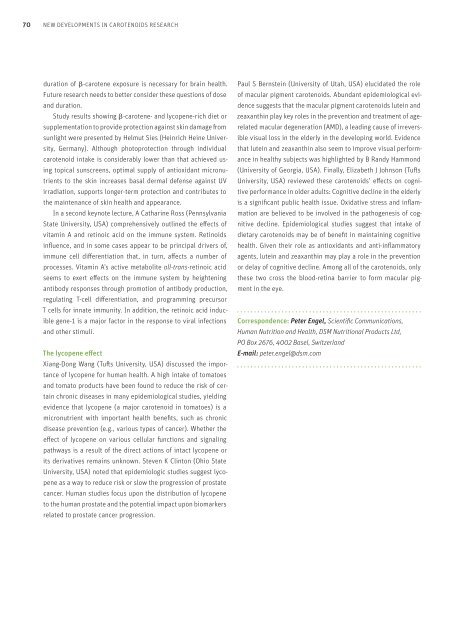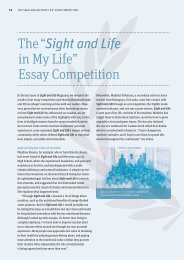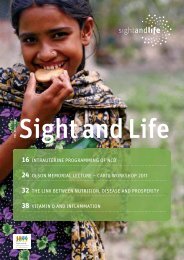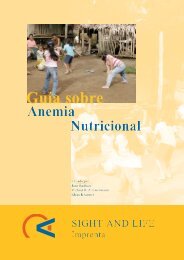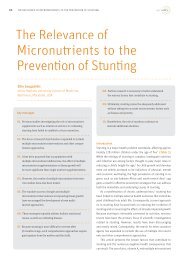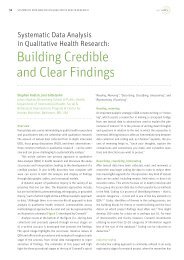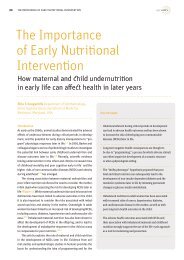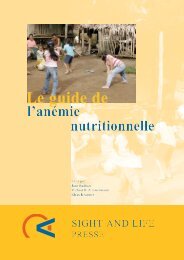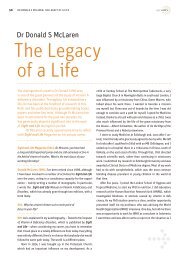Sight and Life Magazine 1/2011
Sight and Life Magazine 1/2011
Sight and Life Magazine 1/2011
You also want an ePaper? Increase the reach of your titles
YUMPU automatically turns print PDFs into web optimized ePapers that Google loves.
70 NEW DEVELOPMENTS IN CAROTENOIDS RESEARCHduration of -carotene exposure is necessary for brain health.Future research needs to better consider these questions of dose<strong>and</strong> duration.Study results showing -carotene- <strong>and</strong> lycopene-rich diet orsupplementation to provide protection against skin damage fromsunlight were presented by Helmut Sies (Heinrich Heine University,Germany). Although photoprotection through individualcarotenoid intake is considerably lower than that achieved usingtopical sunscreens, optimal supply of antioxidant micronutrientsto the skin increases basal dermal defense against UVirradiation, supports longer-term protection <strong>and</strong> contributes tothe maintenance of skin health <strong>and</strong> appearance.In a second keynote lecture, A Catharine Ross (PennsylvaniaState University, USA) comprehensively outlined the effects ofvitamin A <strong>and</strong> retinoic acid on the immune system. Retinoidsinfluence, <strong>and</strong> in some cases appear to be principal drivers of,immune cell differentiation that, in turn, affects a number ofprocesses. Vitamin A’s active metabolite all-trans-retinoic acidseems to exert effects on the immune system by heighteningantibody responses through promotion of antibody production,regulating T-cell differentiation, <strong>and</strong> programming precursorT cells for innate immunity. In addition, the retinoic acid induciblegene-1 is a major factor in the response to viral infections<strong>and</strong> other stimuli.The lycopene effectXiang-Dong Wang (Tufts University, USA) discussed the importanceof lycopene for human health. A high intake of tomatoes<strong>and</strong> tomato products have been found to reduce the risk of certainchronic diseases in many epidemiological studies, yieldingevidence that lycopene (a major carotenoid in tomatoes) is amicronutrient with important health benefits, such as chronicdisease prevention (e.g., various types of cancer). Whether theeffect of lycopene on various cellular functions <strong>and</strong> signalingpathways is a result of the direct actions of intact lycopene orits derivatives remains unknown. Steven K Clinton (Ohio StateUniversity, USA) noted that epidemiologic studies suggest lycopeneas a way to reduce risk or slow the progression of prostatecancer. Human studies focus upon the distribution of lycopeneto the human prostate <strong>and</strong> the potential impact upon biomarkersrelated to prostate cancer progression.Paul S Bernstein (University of Utah, USA) elucidated the roleof macular pigment carotenoids. Abundant epidemiological evidencesuggests that the macular pigment carotenoids lutein <strong>and</strong>zeaxanthin play key roles in the prevention <strong>and</strong> treatment of agerelatedmacular degeneration (AMD), a leading cause of irreversiblevisual loss in the elderly in the developing world. Evidencethat lutein <strong>and</strong> zeaxanthin also seem to improve visual performancein healthy subjects was highlighted by B R<strong>and</strong>y Hammond(University of Georgia, USA). Finally, Elizabeth J Johnson (TuftsUniversity, USA) reviewed these carotenoids’ effects on cognitiveperformance in older adults: Cognitive decline in the elderlyis a significant public health issue. Oxidative stress <strong>and</strong> inflammationare believed to be involved in the pathogenesis of cognitivedecline. Epidemiological studies suggest that intake ofdietary carotenoids may be of benefit in maintaining cognitivehealth. Given their role as antioxidants <strong>and</strong> anti-inflammatoryagents, lutein <strong>and</strong> zeaxanthin may play a role in the preventionor delay of cognitive decline. Among all of the carotenoids, onlythese two cross the blood-retina barrier to form macular pigmentin the eye.Correspondence: Peter Engel, Scientific Communications,Human Nutrition <strong>and</strong> Health, DSM Nutritional Products Ltd,PO Box 2676, 4002 Basel, Switzerl<strong>and</strong>E-mail: peter.engel@dsm.com


